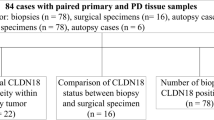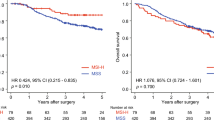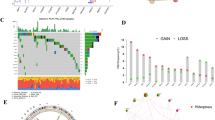Abstract
Purpose
DNA mismatch repair (MMR) protein deficiency has attached more attention for its potential to be a biomarker of immunotherapy for colorectal cancer (CRC) patients. However, clinical models involving the expression status of MMR protein are rare. Herein, we sought to develop two clinical models (a diagnostic model for the prediction of MMR status and a prognostic model for the prediction of disease-free survival) for CRC patients.
Methods
A total of 582 CRC patients were finally included. There were 53 patients with deficient expression of MMR protein. The differences between the deficient MMR (dMMR) group and the proficient MMR (pMMR) group were analyzed.
Results
Compared to pMMR patients, those with dMMR status were younger and had better pathological features (depth of invasion, lymph node metastasis, distant metastasis, pathological stage, perineuronal invasion, and PLT level) and disease-free survival (DFS). The tumor location of the left colon, adenocarcinoma, and abnormal PLT level were identified as the independent predictors for pMMR. Based on these data, we developed the diagnostic model using Logistic regression analysis. It showed a satisfactory accuracy (AUC = 82.3% in the derivate set; AUC = 73.6% in the validation set). Furthermore, pMMR, poorer differentiation, perineuronal invasion, distant metastasis, lower hemoglobin level, and abnormal CEA level were established as the independent prognostic factors of poorer DFS. Based on them, a prognostic model with valuable performance (1-year AUC = 75.5%/3-year AUC = 76.9% in the derivate set; 1-year AUC = 72.3%/3-year AUC = 73.8% in the validation set) was developed.
Conclusions
Our diagnostic and prognostic models could identify CRC patients at risk for pMMR protein expression and disease recurrence. It may contribute to improving the diagnosis and treatment of CRC patients at an individual level.






Similar content being viewed by others
Data availability statement
The original contributions presented in this study are included in the article/supplementary material. Further inquiries can be directed to the corresponding author.
References
Sung H, Ferlay J, Siegel RL, Laversanne M, Soerjomataram I, Jemal A et al (2021) Global Cancer Statistics 2020: GLOBOCAN Estimates of Incidence and Mortality Worldwide for 36 Cancers in 185 Countries. CA Cancer J Clin 71(3):209–249. https://doi.org/10.3322/caac.21660
Chen YE, Kao SS, Chung RH (2016) Cost-Effectiveness Analysis of Different Genetic Testing Strategies for Lynch Syndrome in Taiwan. PLoS ONE 11(8):e0160599. https://doi.org/10.1371/journal.pone.0160599
Tran BT, Choi KS, Sohn DK, Kim SY, Suh JK, Tran TH et al (2021) Estimating cost-effectiveness of screening for colorectal cancer in Vietnam. Expert Rev Pharmacoecon Outcomes Res. https://doi.org/10.1080/14737167.2021.1940963
Siegel RL, Miller KD, Fuchs HE, Jemal A (2021) Cancer Statistics, 2021. CA Cancer J Clin 71(1):7–33. https://doi.org/10.3322/caac.21654
Shi JF, Wang L, Ran JC, Wang H, Liu CC, Zhang HZ et al (2021) Clinical characteristics, medical service utilization, and expenditure for colorectal cancer in China, 2005 to 2014: Overall design and results from a multicenter retrospective epidemiologic survey. Cancer 127(11):1880–1893. https://doi.org/10.1002/cncr.33445
André T, Shiu KK, Kim TW, Jensen BV, Jensen LH, Punt C et al (2020) Pembrolizumab in Microsatellite-Instability-High Advanced Colorectal Cancer. N Engl J Med 383(23):2207–2218. https://doi.org/10.1056/NEJMoa2017699
Boland CR, Goel A (2010) Microsatellite instability in colorectal cancer. Gastroenterology 138(6):2073–87.e3. https://doi.org/10.1053/j.gastro.2009.12.064
Cohen R, Colle R, Pudlarz T, Heran M, Duval A, Svrcek M et al (2021) Immune Checkpoint Inhibition in Metastatic Colorectal Cancer Harboring Microsatellite Instability or Mismatch Repair Deficiency. Cancers (Basel). 13(5). https://doi.org/10.3390/cancers13051149
Zhao L (2018) Mismatch repair protein expression in patients with stage II and III sporadic colorectal cancer. Oncol Lett 15(5):8053–8061. https://doi.org/10.3892/ol.2018.8337
Vilar E, Gruber SB (2010) Microsatellite instability in colorectal cancer-the stable evidence. Nat Rev Clin Oncol 7(3):153–162. https://doi.org/10.1038/nrclinonc.2009.237
Li GM (2008) Mechanisms and functions of DNA mismatch repair. Cell Res 18(1):85–98. https://doi.org/10.1038/cr.2007.115
Wang Y, Zhao Z, Zhuang J, Wu X, Wang Z, Zhang B et al (2021) Prognostic Value of Autophagy, Microsatellite Instability, and KRAS Mutations in Colorectal Cancer. J Cancer 12(12):3515–3528. https://doi.org/10.7150/jca.51430
National Health Commission Of The People's Republic Of C. (2020) National guidelines for diagnosis and treatment of colorectal cancer 2020 in China (English version). Chinese journal of cancer research = Chung-kuo yen cheng yen chiu. 32(4):415–45. https://doi.org/10.21147/j.issn.1000-9604.2020.04.01
NCCN (2021) The NCCN colon cancer clinical practice guidelines in oncology (Version 1.2021)[EB/OL]. Fort Washington: NCCN, 2021. https://www.nccn.org/guidelines/guidelines-detail?category=1&id=1428
NCCN (2021) The NCCN rectal cancer clinical practice guidelines in oncology (Version 1.2021)[EB/OL]. Fort Washington: NCCN, 2021. https://www.nccn.org/guidelines/guidelines-detail?category=1&id=1461
Ruiz-Bañobre J, Goel A (2019) DNA Mismatch Repair Deficiency and Immune Checkpoint Inhibitors in Gastrointestinal Cancers. Gastroenterology 156(4):890–903. https://doi.org/10.1053/j.gastro.2018.11.071
Chinese College of Surgeons, Chinese Anti-Cancer Association, Chinese Medical Doctor Association, Chinese Society of Clinical Oncology, Chinese Medical Doctor Association, Anorectal Branch of Chinese Medical Doctor Association et al (2021) China guideline for diagnosis and comprehensive treatment of colorectal liver metastases (version 2020). Zhonghua Wei Chang Wai Ke Za Zhi. 2021;24(1):1–13. https://doi.org/10.3760/cma.j.cn.441530-20201225-00680
Van Cutsem E, Cervantes A, Adam R, Sobrero A, Van Krieken JH, Aderka D et al (2016) ESMO consensus guidelines for the management of patients with metastatic colorectal cancer. Annals of oncology : official journal of the European Society for Medical Oncology 27(8):1386–1422. https://doi.org/10.1093/annonc/mdw235
Yoshino T, Arnold D, Taniguchi H, Pentheroudakis G, Yamazaki K, Xu RH et al (2018) Pan-Asian adapted ESMO consensus guidelines for the management of patients with metastatic colorectal cancer: a JSMO-ESMO initiative endorsed by CSCO, KACO, MOS, SSO and TOS. Annals of oncology : official journal of the European Society for Medical Oncology 29(1):44–70. https://doi.org/10.1093/annonc/mdx738
Zhang S, S. Z., Li J, Cai SJ, Xu RH, Zhang Z, Yuan Y et al (2019) Chinese Society of Clinical Oncology (CSCO) diagnosis and treatment guidelines for colorectal cancer 2018. Chinese J Cancer Res. 31(1):117–34. https://doi.org/10.21147/j.issn.1000-9604.2019.01.07
Bach AG (2017) TNM Classification of Malignant Tumours. Radiologe 57(3):244–245
Sedgwick P (2015) How to read a receiver operating characteristic curve. BMJ 350:h2464. https://doi.org/10.1136/bmj.h2464
Liang Y, Cai X, Zheng X, Yin H (2021) Analysis of the Clinicopathological Characteristics of Stage I-III Colorectal Cancer Patients Deficient in Mismatch Repair Proteins. Onco Targets Ther 14:2203–2212. https://doi.org/10.2147/OTT.S278029
Lee CT, Chow NH, Chen YL, Ho CL, Yeh YM, Lin SC et al (2021) Clinicopathological features of mismatch repair protein expression patterns in colorectal cancer. Pathol Res Pract 217:153288. https://doi.org/10.1016/j.prp.2020.153288
Nakano K, Yamamoto H, Fujiwara M, Koga Y, Tsuruta S, Ihara E et al (2018) Clinicopathologic and Molecular Characteristics of Synchronous Colorectal Carcinoma With Mismatch Repair Deficiency. Am J Surg Pathol 42(2):172–182. https://doi.org/10.1097/pas.0000000000000947
Kim YH, Min BH, Kim SJ, Choi HK, Kim KM, Chun HK et al (2010) Difference between proximal and distal microsatellite-unstable sporadic colorectal cancers: analysis of clinicopathological and molecular features and prognoses. Ann Surg Oncol 17(5):1435–1441. https://doi.org/10.1245/s10434-009-0888-4
Tong G, Zhang G, Liu J, Zheng Z, Chen Y, Niu P et al (2020) Cutoff of 25% for Ki67 expression is a good classification tool for prognosis in colorectal cancer in the AJCC8 stratification. Oncol Rep 43(4):1187–1198. https://doi.org/10.3892/or.2020.7511
Batur S, Vuralli Bakkaloglu D, Kepil N, Erdamar S (2016) Microsatellite instability and B-type Raf proto-oncogene mutation in colorectal cancer: Clinicopathological characteristics and effects on survival. Bosn J Basic Med Sci 16(4):254–60. https://doi.org/10.17305/bjbms.2016.1238
Li W, Li H, Liu R, Yang X, Gao Y, Niu Y et al (2018) Comprehensive Analysis of the Relationship Between RAS and RAF Mutations and MSI Status of Colorectal Cancer in Northeastern China. Cell Physiol Biochem 50(4):1496–1509. https://doi.org/10.1159/000494649
Kaur G, Masoud A, Raihan N, Radzi M, Khamizar W, Kam LS (2011) Mismatch repair genes expression defects & association with clinicopathological characteristics in colorectal carcinoma. Indian J Med Res 134(2):186–192
Kang S, Na Y, Joung SY, Lee SI, Oh SC, Min BW (2018) The significance of microsatellite instability in colorectal cancer after controlling for clinicopathological factors. Medicine (Baltimore) 97(9):e0019. https://doi.org/10.1097/md.0000000000010019
Zheng H, Bai Y, Wang J, Chen S, Zhang J, Zhu J et al (2021) Weighted Gene Co-expression Network Analysis Identifies CALD1 as a Biomarker Related to M2 Macrophages Infiltration in Stage III and IV Mismatch Repair-Proficient Colorectal Carcinoma. Front Mol Biosci 8:649363. https://doi.org/10.3389/fmolb.2021.649363
van der Heide DM, Turaga KK, Chan CHF, Sherman SK (2021) Mismatch Repair Status Correlates With Survival in Young Adults With Metastatic Colorectal Cancer. J Surg Res 266:104–112. https://doi.org/10.1016/j.jss.2021.03.040
Zhang M, Chen T (2021) Overview on population screening for carriers with germline mutations in mismatch repair (MMR) genes in China. Hered Cancer Clin Pract 19(1):26. https://doi.org/10.1186/s13053-021-00182-1
Suzuki O, Yamaguchi T, Fukuchi M, Mochiki E, Arai T, Akagi K et al (2021) Prediction Model for Gastric Cancer With DNA Mismatch Repair Deficiency. Anticancer Res. 41(2):975–82. https://doi.org/10.21873/anticanres.14851
Climent M, Ryan ÉJ, Stakelum Á, Khaw YL, Creavin B, Lloyd A et al (2019) Systemic inflammatory response predicts oncological outcomes in patients undergoing elective surgery for mismatch repair-deficient colorectal cancer. Int J Colorectal Dis 34(6):1069–1078. https://doi.org/10.1007/s00384-019-03274-6
Li J, Zhang Y, Xu Q, Wang G, Jiang L, Wei Q et al (2021) Systemic Inflammatory Markers of Resectable Colorectal Cancer Patients with Different Mismatch Repair Gene Status. Cancer Manag Res 13:2925–2935. https://doi.org/10.2147/cmar.S298885
Lengyel CG (2021) Microsatellite Instability as a Predictor of Outcomes in Colorectal Cancer in the Era of Immune-Checkpoint Inhibitors. Curr Drug Targets. https://doi.org/10.2174/1389450122666210325121322
Overman MJ, Lonardi S, Wong KYM, Lenz HJ, Gelsomino F, Aglietta M et al (2018) Durable Clinical Benefit With Nivolumab Plus Ipilimumab in DNA Mismatch Repair-Deficient/Microsatellite Instability-High Metastatic Colorectal Cancer. J Clin Oncol 36(8):773–779. https://doi.org/10.1200/jco.2017.76.9901
Sun Z, Xia W, Lyu Y, Song Y, Wang M, Zhang R et al (2021) Immune-related gene expression signatures in colorectal cancer. Oncol Lett 22(1):543. https://doi.org/10.3892/ol.2021.12804
Dagmura H, Daldal E, Okan I (2021) The Efficacy of Hemoglobin, Albumin, Lymphocytes, and Platelets as a Prognostic Marker for Survival in Octogenarians and Nonagenarians Undergoing Colorectal Cancer Surgery. Cancer Biother Radiopharm. https://doi.org/10.1089/cbr.2020.4725
Acknowledgements
We appreciate Pro. Liu (Nanjing Medical University) and Qing Chen (Nanjing Medical University) for their help in this study. This study was sponsored by the Medical Research Project of Jiangsu Health Commission (Z2021010), the Changzhou Sci&Tech Program (CJ20210017 and CJ20210013), and the Clinical Technology Development Foundation of Jiangsu University (JLY2021022).
Author information
Authors and Affiliations
Contributions
Yixin Xu conceived and designed the study and wrote the manuscript. Yuzhe Li collected the original data. Jing Yang and Ziyan Zhu analyzed the data. Yixin Xu and Yulin Tan designed and edited the figures and tables. Yibo Wang and Xuezhong Xu reviewed and edited the manuscript. All authors agree to be accountable for the content of this work. All authors contribute to the article and approved the submitted version.
Corresponding authors
Ethics declarations
Ethics approval
Our study was approved by the ethics committee of Wujin Hospital. Written informed consent was obtained from the patients including in the present study.
Competing interests
The authors declare no competing interests.
Conflict of interest
The authors declare no competing interests.
Additional information
Publisher's Note
Springer Nature remains neutral with regard to jurisdictional claims in published maps and institutional affiliations.
Supplementary Information
Below is the link to the electronic supplementary material.
Rights and permissions
About this article
Cite this article
Xu, Y., Li, Y., Zhu, Z. et al. Development of novel models for predicting mismatch repair protein deficiency and relevant disease-free survival in colorectal cancer patients. Int J Colorectal Dis 37, 1449–1464 (2022). https://doi.org/10.1007/s00384-022-04150-6
Accepted:
Published:
Issue Date:
DOI: https://doi.org/10.1007/s00384-022-04150-6




